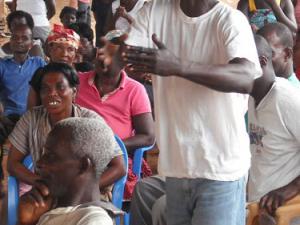New Global Witness site: Putting people in charge of their forests
Discussion details
Millions of people live in forests and depend on them for everything. Shouldn’t they have a say in how they’re managed? Our new collection of stories from Africa to Latin America shows how putting communities in charge of their forests is having a transformative effect on development and ecosystems: www.globalwitness.org/foreststories/
For example, Ecuador is rich in tropical forests which cover a third of the country. Every square kilometre of forest supports around 150 people. But Ecuadorians have limited rights and only half of the indigenous groups and smallholder farmers that customarily own their forests have legal title to them. One of the biggest problems at the local level was lack of access to information. Global Witness and Grupo FARO helped local groups organise and train communities to use a law obliging the government to make available information considered in the public interest. They now find themselves in a better position to protect their rights and the forests.

Community meeting in Saamang, Ghana
In Ghana, we partnered with the Centre for Indigenous Knowledge and Organisational Development (CIKOD) worked with local chiefs to change a pattern of forest destruction and the loss of economic benefits, to agree a charter based on a combination of traditional and modern natural resource management practices. “The kingdom is bigger than the most powerful chief,” said Osahene Aterkyi II, President of a Regional House of Chiefs, who trialled the charter in his community and sees it as a vital step to improve local accountability. The experience provided important lessons on bringing communities and traditional leaders into the debate on forest protection. Improving rights, access to information and accountability are vital. But local groups are also taking action to stop abuse of the laws meant to control forest management.
Emmanuel Belashayi, a member of our partner Réseau Ressources Naturelles (RRN, the Natural Resources Network) in Bateke Plateau, on the east bank of the Congo River in the Democratic Republic of Congo explains: “In this area, if a Congolese person has an artisanal logging permit, there is usually a Chinese company hiding behind him.” Such permits are meant to allow communities to make a living from small scale extraction of timber. But Emmanuel found that companies were buying up the permits and using them to log anywhere. He worked with Global Witness to bring the abuse to the attention of the government which led to a ministerial clampdown.

Community member from Nongempela, Bandundu, DRC
Other, similar stories to these can be found from the Sustainable Development Institute in Liberia to Derecho, Ambiente y Recursos Naturales in Peru and beyond.
We need governments to make big decisions to steer humanity to operate within planetary boundaries. Action at that level can reallocate resources from destructive to constructive activities, and globally from those with more than enough to those who have too little. Humanity as a whole needs to find a way to live with, rather than cut down, forests that are intrinsically valuable, vital for local livelihoods and, in an age of climatic upheaval, something upon which we all depend for our collective survival.
Each one of these is a David-and-Goliath story about ordinary people taking often extraordinary risks to secure their right to have a say, to control the resources on which they depend, and to see justice is done when things go wrong. The eight stories we publish today are snapshots in an ongoing struggle to let people manage their own forests.
David Young, International Forests Advisor +251 9 3537 7236 dyoung@globalwitness.org
Alice Harrison, Communications Advisor +44 20 7492 5890 aharrison@globalwitness.org
Log in with your EU Login account to post or comment on the platform.